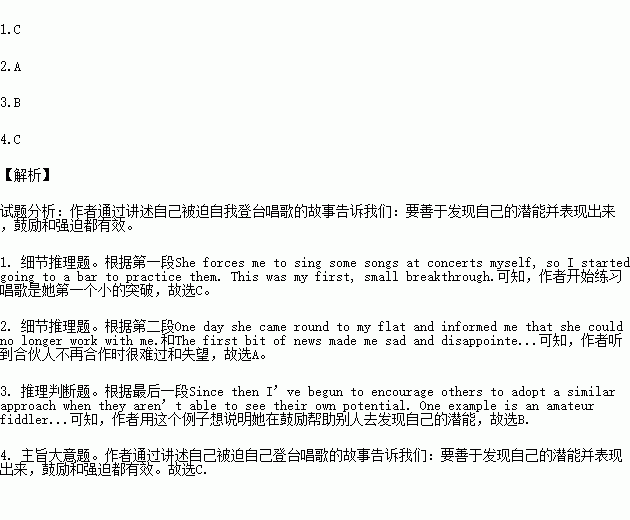题目内容
Back in the days when I wrote my first songs, I hated my voice. I saw myself as a songwriter and guitarist but never a singer! I continued to write songs, and to search for the perfect singer. After a few years I did discover a singer, so we started a project together. We held a few concerts, and put a lot of work into it. She forces me to sing some songs at concerts myself, so I started going to a bar to practice them. This was my first, small breakthrough.
One day she came round to my flat and informed me that she could no longer work with me, and also that the bar owner at the open mic venue(麦克风场地) had replaced us at short notice because some New York jazz star happened to be in town, and was available that evening to perform. The first bit of news made me sad and disappointed, but the second made me angry.
However, that same evening, with as much determination as I could muster (集合), I resolved to play three new songs at the bar, just as I had planned before. I was quite nervous, but I dragged myself down to the bar and sang those songs! I never felt so liberated(无拘束的). That night I couldn’t get to sleep. I was simply astonished, hardly believing that I was a person who acted so courageously, and that I’d been able to sing my songs myself.
Since then I’ve begun to encourage others to adopt a similar approach when they aren’t able to see their own potential. One example is an amateur fiddler (小提琴手) who could barely bring herself to lift her instrument to play in front of people. I forced her to ignore her fear, and simply get on with it. Now, a year or two later, she is a passionate, happy performer in front of any crowd!
Once you get the ball rolling in yourself, you can start inspiring those around you.
1.What was the author’s first breakthrough?
A. She found the perfect singer.
B. She started a project with her partner.
C. She started to practice songs at a bar.
D. She was able to sing all of her songs.
2.How did the author feel when she heard that her partner could no longer work with her?
A. Sad and disappointed.B. Sad and angry.
C. Disappointed and angry.D. Astonished and angry.
3.The amateur fiddler is mentioned in the last but one paragraph in order to show that the author ________.
A. has a good relationship with her
B. encourages others to see their potential
C. can perform in front of any crowd
D. is very interested in making friends
4.What’s the passage mainly about?
A. How to work with other singers.
B. The story of the author and an amateur fiddler.
C. How the author became a singer through her fighting spirit.
D. How to write beautiful songs.

